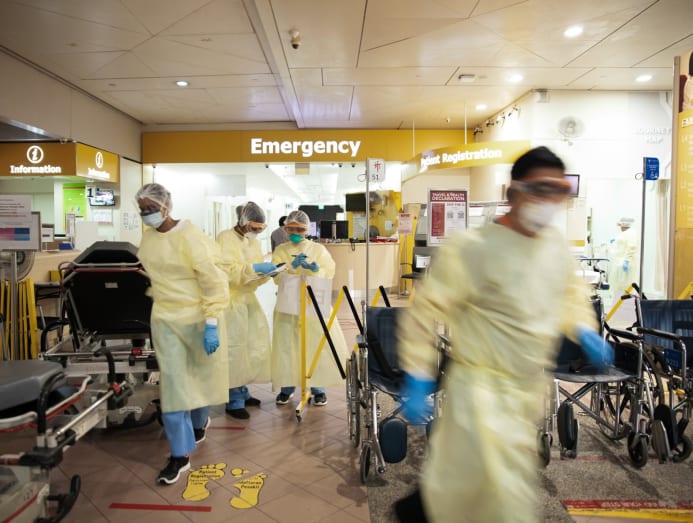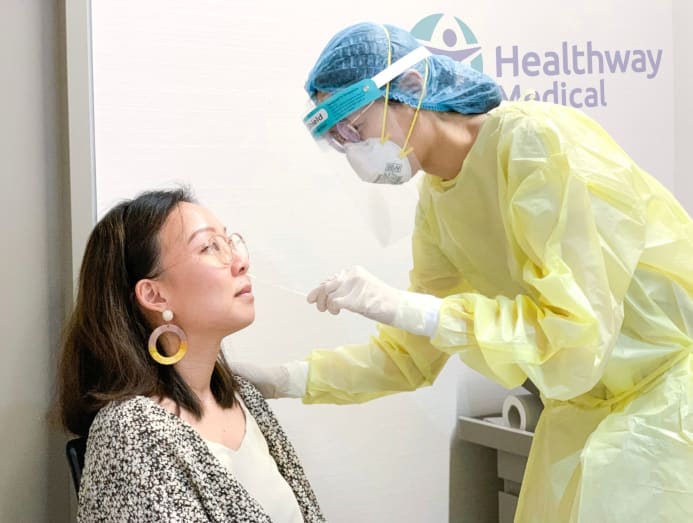Commentary: Why are Singapore employers insisting on MCs for COVID-19 cases?
Proving you were ill required you to see a doctor, but COVID-19 may have made MCs redundant, says Singapore Human Resources Institute’s Alvin Aloysius Goh.

Most companies in Singapore require medical certificates from approved doctors when employees take sick leave. (Photo: Monica Kotwani)
SINGAPORE: Would you believe that even ancient Egyptians had paid sick days? Ancient Egypt had a state-supported healthcare network to ensure workers building the king’s tomb kept working, according to anthropologist Anne Austin.
Of course, we don’t know if proof – our current-day iteration of medical certificates or MCs – was required. But workers being given days to rest when they were unwell is steeped in the history of work.
There was a more practical reason: A sick worker risked infecting others, potentially disrupting operations.
In Singapore, most employees have a minimum of 14 days of paid sick leave, protected by Singapore’s Employment Act.
Before COVID-19 upended the way we worked, taking a sick day was a simple matter. Employees kept supervisors informed, went to see the doctor, collected their MC and stayed at home to recover.
Most working adults in relatively good health would not bust the 14-day limit. Even if they did, it was normal to dip into annual leave or tap on hospitalisation leave.
Sure, there were the usual inconveniences if key collaborators were absent when a deadline was looming or if we had to take on more work to cover for a sick teammate.
But then came COVID-19 and made it all more complicated.
MEDICAL CERTIFICATES IN A PANDEMIC
At the start of the pandemic, Singapore erred on the side of caution: Respiratory symptoms got you a five-day MC from the doctor and a legal requirement to stay home.
But today’s context is vastly different. With high vaccination coverage and a milder Omicron variant, the Ministry of Health’s protocols are clear: For the vast majority who test positive but are well or experience mild symptoms, they should self-isolate at home until they test negative or complete the recommended isolation period - with no need to see a doctor.

So it was remarkable that Minister for Manpower Tan See Leng had to explicitly stress this to employers: Do not request MCs from staff who test positive for COVID-19 nor ask for recovery memos or a medical assessment to show they are fit to return.
Yet, general practitioner clinics, polyclinics and even hospitals were inundated – including by those with mild or no symptoms in search of that precious piece of administrative paper to justify their absence from work.
To me, this was a clear waste of time and financial resources, and worse, increased the risk of exposure to infected members of the public.
On Tuesday (Mar 1), Dr Tan said in Parliament that employers who continue insisting on MCs from employees who test positive for COVID-19 with mild symptoms should be reported to the Ministry of Manpower “for further action to be taken”.
STUBBORN EMPLOYERS OR DISHONEST EMPLOYEES?
Is this the case of some employers clinging stubbornly to old familiar ways?
Requiring paper MCs harks back to the days when the only valid proof of sickness was from a certified medical doctor.
It sticks out sorely when we think of all the major workplace transformations during the pandemic, when businesses had little choice but to reframe and repurpose policies for this new normal.
But surely, it’s not a piece of paper employers are after. What bosses really want is reassurance that workers aren’t malingering. This can create real operational problems amid manpower shortages, high absenteeism rate due to Omicron and the struggle to stay profitable and productive – a perfect storm for smaller companies whose work cannot be done remotely.
Some employees, commenting in media reports, lament that bosses don’t trust them.
And the reality is even if a small handful of employees try to game the system, how often can dishonest individuals hide behind fake test results to skip work?

Employers certainly need to learn how to trust their staff more. Some companies only require employees to upload their positive test to their line managers.
It can be as simple as a “click and send” approach, using photographs or quick forms. Keeping it simple reduces the workload for HR departments and line managers to monitor the status of their workforce - no more logging on to Intranet or a third-party system to update statuses.
Some companies, like OCBC Bank, had a no-questions-asked policy to allow employees to work from home for one week after receiving their vaccinations.
And if bosses want more time to adjust to a higher level of trust? Well, there’s a whole host of options available that doesn’t further burden an already-stressed healthcare system.
The Government set up Quick Test Centres and Combined Test Centres for people to do a supervised antigen rapid test (ART). The result would be sent via SMS and reflected in HealthHub, serving as an official record of testing positive for COVID-19.
Employers can also look at telemedicine options, where ART can be done over video consultation.
SICK LEAVE AND HR POLICIES MUST ADAPT TO THE NEW NORMAL
This episode might be the push that we need to rethink policies around sick leave and medical certificates.
At a time when endemic living seems within grasp and nothing is normal in the workplace, effective HR policies cannot be sacred and unchanging.
Have our policies become outdated and unsuited for the new normal? What do we do?
First is, of course, trust.
According to the Edelman Trust Barometer, the trust level between employees and employers was high in 2020. But that could change if employers do not reciprocate and instead attempt to enforce an inflexible policy.
What are the challenges Singapore faces in shifting to living with an endemic COVID-19? Listen to CNA's Heart of the Matter:
Second, companies should focus on outcomes, rather than be bean counters. Employees’ performance should be evaluated based on what they deliver, not the number of days in or out of the office.
But this might not be straightforward for employees not in office jobs.
In a post-pandemic Singapore, should companies expand sick leave to more than 14 days? How about a points system for employees to “buy leave” should they use up their entitlement, or have leave donation programmes? Whatever the solution, companies need to engage employees and communicate policies clearly.
In my view, we can go even further - provide leave without the need for proof.
Many organisations have introduced mental health days as part of the annual leave package in view of the toll wrought by the pandemic. Employees do not need any administrative proof and can simply inform supervisors they need a break.
If we are to live with COVID-19 for the foreseeable future, employers and employees need to examine the underlying issues, be it trust, operations or people matters. And insisting on paper proof of illness doesn’t address any of that.
Alvin Goh is the Executive Director of the Singapore Human Resources Institute and a Member of the Chartered Institute of Personnel & Development (UK).








